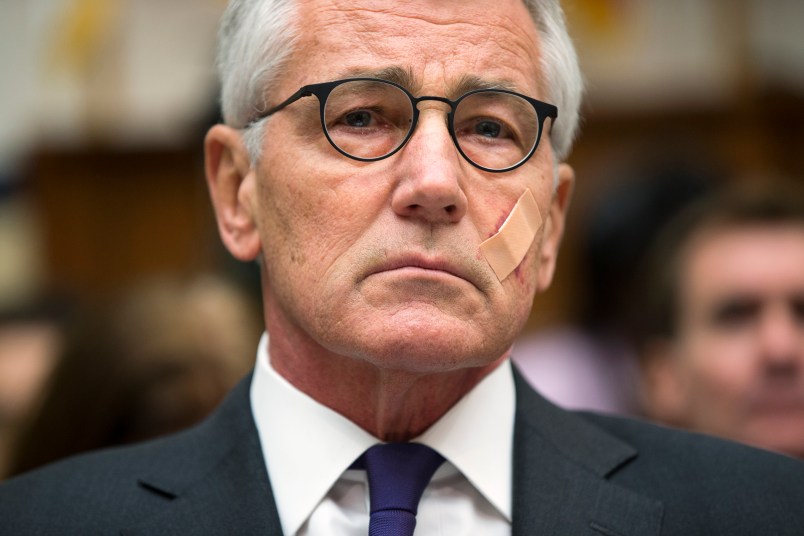The divorce of President Barack Obama and Defense Secretary Chuck Hagel had no singular cause, according to an insider close to Hagel, but boiled largely down to Hagel’s dissatisfaction with the Obama White House’s national security bureaucracy and the reality that Hagel had become the “weak link” in the public view of the president’s foreign policy team.
Steve Clemons, The Atlantic editor-at-large and founder of the New America Foundation’s America Strategy program who was a high-profile public advocate for Hagel’s nomination as defense secretary, told TPM in a phone interview Monday that Hagel’s resignation “happened faster than I expected” but he had expected it to come eventually.
Hagel had chafed at what Clemons calls the “degraded” structural discipline of the White House national security team under National Security Adviser Susan Rice. But at the same time, Hagel might have made his own mistakes by not “playing the public game,” Clemons said.
In the end, Clemons concluded, Hagel became the most obvious first casualty as the White House sought a “reset” on foreign policy heading into its final two years.
“I knew at least from his side that there was substantial frustration with the national security decision-making structure,” Clemons said. But he added that it “would be easy and probably wrong” to view Hagel’s resignation as the result of a clash of personalities.
“I think Hagel is looked at as the weak link publicly. The president has received enormous criticism recently in the press for what are perceived to be a lot of mistakes,” Clemons said. Hagel “got undermined and seen publicly as the weak link, and so if you’re going to blame someone and press reset on what Obama’s team needs to look like, then Hagel was a natural one to go.”
Hagel’s resignation was less the result of obvious policy differences — though Hagel’s approach to policy was as what Clemons called a strategic realist, as opposed to the more liberal interventionists that are increasingly the voice of the Obama foreign policy team — and more a procedural split.
Previously, under former National Security Adviser Tom Donilon and then-NSC chief of staff, now-White House chief of staff Denis McDonough, Clemons said, there was a clear structure for how meetings were scheduled and how messaging was handled. Since Donilon’s departure and McDonough’s promotion, however, that structure was — at least in Hagel’s eyes — diminished. Clemons gave the examples of who was in attendance and who was given the floor during NSC meetings.
“There was a tightness to the process that has degraded significantly,” Clemons said. “I think there was tension between Hagel and Susan Rice and tension over what the appropriate conduct was in terms of managing Cabinet secretaries and their time with Obama.”
While Hagel maintained a strong influence on Obama behind the scenes, Clemons said, he also failed on his own to be a forceful public advocate for himself and the administration. That might have ultimately made him easier to remove, as opposed to somebody like Secretary of State John Kerry, who is consistently pursuing a very public agenda.
“Hagel saw himself as an implementer of Obama’s policies and not a maker of policies in the public, and perhaps that was a mistake,” Clemons said. “There was a big gap between what people saw publicly of Hagel. … That’s one of the factors that undermined his effectiveness.”
That’s not to say these were purely stylistic differences, Clemons said. Hagel was usually the one who would be warning against reacting to what Clemons called “the emotional moment” on the crises in Syria and Ukraine.
“I think he did see undisciplined thinking taking hold. You can call that both a problem of process and substance,” Clemons said. “He’s been the guy who’s saying, ‘Be careful of impulsive, emotional campaigns that disrupt our relations more broadly. … I think ultimately the biggest difference between Hagel and some of these other people that are dominating, those people that are caught up in the emotional moment about the misbehavior of one of these strategic actors fault those in the room who say, ‘Be careful,’ who advise caution.”
Whether Hagel’s resignation serves as a pivot point for Obama’s foreign policy will depend on who the president picks to succeed him, but Clemons said that he expects a shift at the Defense Department from Hagel’s strategic realism to more of a national security hawk.
“Obama himself has not been able to articulate and stick to a strategically coherent plan. … His administration has become overly reactive to problems, and not strategic. Hagel is a strategic guy,” Clemons said. The change “really will make permanent the notion that Obama not only didn’t dismantle the national security state, he reified it and doubled-down in the end, that he didn’t have the courage of his convictions in a way to go a Hagel route.”







Stop appointing Rs to SecDef. There’s a start!
Yeah, who wants a guy who is anti-war and wants to cut the defense budget, what stupid ideas those are.
Typical Republicant.
Obama’s whole plan to “reach across the aisle in bi-partisanship” has only resulted in getting his hand cut off every time bu the hate-filled rethugs. And Hagel is still one of them.
I imagine the Obama Administration is deeply frustrated by Hagel’s inability to keep his complaints to himself.
Absurd idea.